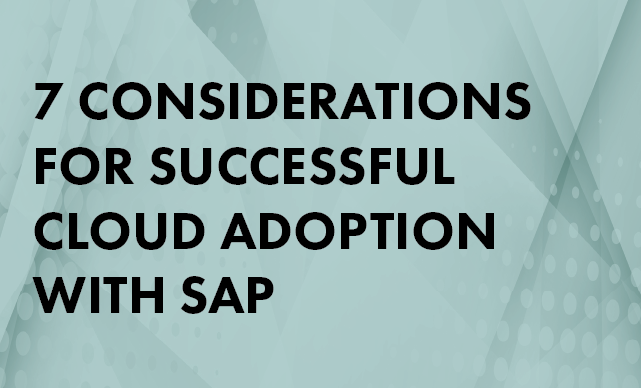
Moving mission-critical applications such as SAP to the cloud can provide a great return in terms of user satisfaction and fiscal management. For an optimal return, however, you can’t go it alone — you need to carefully consider a cloud service provider (CSP) who can help you maximize your experience by helping you meet performance requirements, plan your migration, and execute. Before you take the plunge, ask yourself these six basic questions:
1. How do you assure performance?
Many CSPs will not or cannot provide service-level agreements (SLAs) around performance. Companies looking to move their mission-critical SAP workloads to the cloud must have confidence that the systems will perform in the cloud as well as they do on premises — if not better. Understanding how the CSP will manage potential “noisy neighbor” issues is an important component to consider when choosing a provider.
2. What is the billing methodology?
One of the advantages of cloud deployment is the flexible billing when compared to old, managed hosting models. Some clouds charge based on the resources allocated, but offer the option to shut down systems when not in use to limit costs. A small number of providers take this a step further and offer true consumption-based billing, similar to how the power company bills per kilowatt used.
Explore related questions
3. Where are your data centers located?
The end-user experience should always play a role in the decision making process. It is critical that the perceived performance does not decrease when moving systems to the cloud. Latency is a concern whenever moving systems off premises. Some applications are highly resilient to latency, but others require multiple round-trips during communication sessions. Having data centers in advantageous locations is important when choosing where to host cloud workloads.
4. When can you start a migration?
An SAP migration is a complex, time-consuming process. Customers can be more confident in a CSP that has the expertise and experience of migrating SAP workloads to the cloud, and can trust their recommendations.
5. Who are your customers?
It is important for CSPs to provide a list of reference customers that include enterprises of similar scope, size, and motivations. Knowing that Global 2000 companies run their production SAP S/4HANA systems in the CSP’s environment can be reassuring for prospective customers.
6. Why are you different than others in the space?
Knowing what, if anything, separates one CSP from another is important because this will help you to understand what additional value can be gained by moving to the cloud. Spinning up VMs or allocating more storage on demand are table stakes for most CSPs. Others specialize in the SAP world and have purpose-built clouds to ensure that SAP HANA runs as expected and SAP has the uptime and performance assurances required for mission-critical applications. Additionally, a small number of CSPs focus on innovation in the SAP world.






